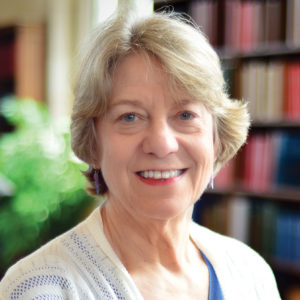Washington University in St. Louis is a new member of the Age Friendly University Global Network, a group of educational institutions committed to expanding programs and policies to engage people in all life stages.
Universities in the network help develop innovations in education, research and community engagement in order to increase age-diversity on campus, improve multigenerational learning environments, and create opportunities for career development across a longer life course.

“Life expectancy has doubled in the last century,” said Nancy Morrow-Howell, the Bettie Bofinger Brown Distinguished Professor of Social Policy at the Brown School and director of the Harvey A. Friedman Center for Aging at the Institute for Public Health.
“For financial as well as personal reasons, adults are working longer into the extended life course and are seeking opportunities for ongoing education. By joining this network, Washington University can work with other institutions across the globe to respond to the new reality of population aging,” she said.
Washington University already has many programs and resources for adults of all ages.
Almost 10 percent of Washington University’s student population is 35 and older, with higher percentages seen in professional degree programs. In addition, seminars, workshops and programs, such as the Lifelong Learning Institute, serve adults who want to learn without pursuing a degree.
“We can and should do more to offer opportunities that support learning and engagement throughout our lives,” Morrow-Howell said. “We must operate as a more age-diverse university and reflect the communities in which we live and work.”
With support from the Office of the Chancellor, Morrow-Howell has helped launch a new initiative called Washington University for Life. Through collaboration with schools, departments and institutes across the university, the program aims to:
- Expand opportunities for people to engage in education throughout the life course, via degree and certificate programs, individual courses, campus seminars and other activities.
- Build skills among faculty, staff and students to work in multigenerational environments.
- Institutionalize programs that facilitate transitions between jobs as well as into retirement, with a focus on ongoing purpose and meaningful engagement.
- Increase knowledge through research on multigenerational education, age-stereotype in academia, and educational pathways for longer lives.
“Our institution aims to build and support habits of lifelong learning among our faculty, staff, students and alumni,” Chancellor Mark S. Wrighton said. “We look forward to exploring how Washington University can become a ‘University for Life’ that realizes a vision of lifelong engagement, learning and purpose.”
University College in Arts & Sciences serves a greater number of older students than any other unit on campus.
Mark Rollins, dean of University College, said he understands the importance of research on learning and instructor training to effectively serve age-diverse classrooms.
“We must increase our knowledge about educational needs and effective programming for students in mid-life and beyond, and extend our teaching skills to best serve multigenerational classrooms,” Rollins said.
The Next Move Program at the Brown School is an example of an existing program that will be strengthened as part of the Washington University for Life initiative. Next Move supports students returning for graduate school after substantial work or life experience.
Lynne Johnson (MSW ’18), helped establish a student group affiliated with the Next Move program.
“I returned to school after significant work experience and noticed that some students, including myself, felt disconnected from younger peers and current learning environments,” Johnson said. “We hope the Next Move student group will help students redefine, restart or advance their careers as part of the Washington University community.”
After piloting the group in the Brown School with support from the Friedman Center for Aging, organizers hope it can serve as a model for student groups in other schools and departments.
Working with an internal advisory committee, the Friedman Center will continue to collect feedback from faculty, staff, students and alumni during the current academic year. The team will use the feedback to finalize plans to build on existing university programs, work with departments to pilot new programs and develop a research agenda from which to learn and improve these efforts.